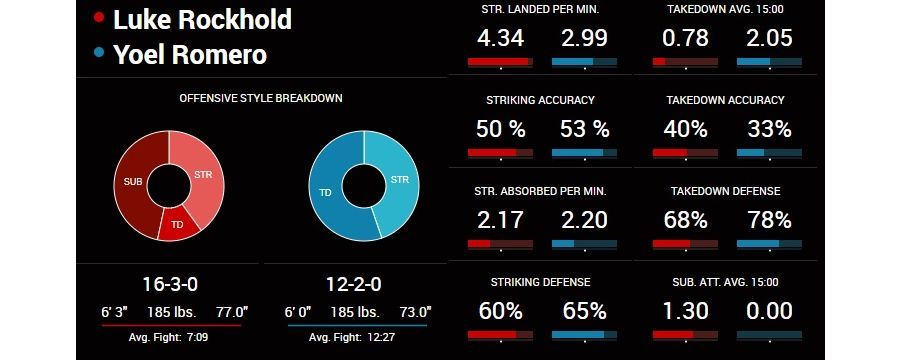The withdrawal of UFC middleweight champion Robert Whittaker created an opportunity for Yoel Romero. He will now face former champion Luke Rockhold in the main event of UFC 221 for the interim middleweight championship and the first crack at Whittaker when he returns. The opponent change likely precipitated drastic game plan changes for Rockhold since Romero and Whittaker are very different fighters. The new bout is an interesting matchup with multiple angles to explore.
The following is an analysis of the statistical categories that could end up being the difference on Saturday.
Average fight time
Despite scoring finishes in the majority of his bouts, Romero does have a penchant to get involved in longer fights. Before his title fight against Whittaker, Romero had won five of his past seven bouts via third-round stoppage, and his average fight time reflects that pace. Through nine UFC fights, Romero's average fight time currently stands at 12:43.
On the other hand, half of Rockhold's fights in the Octagon have ended in the first round. His average fight time in the UFC is 6:26, and his last fight against David Branch was his longest in the promotion to date (9:04). Per this metric, a longer fight should favor Romero. However, both of Rockhold's UFC losses have come in the first round, and Romero lost his only fight that went five rounds.
Striking differential
 click to enlarge
click to enlarge
In terms of striking differential (the difference between significant strikes landed per minute and significant strikes absorbed per minute) Rockhold has a substantial advantage. His striking differential in the UFC is plus-2.50, while Romero's is currently plus-0.77. Both fighters have displayed respectable striking defense as they only absorb 2.24 (Romero) and 2.50 (Rockhold) significant strikes per minute. However, the differentiation comes from the offensive perspective. Romero has only landed 3.02 significant strikes per minute, while Rockhold has landed 5.16 in the UFC.
Rockhold's higher striking rate is partially due to his much higher level of activity. During his UFC career, he has attempted 8.46 significant strikes per minute. He lands 61 percent of those strikes, which leaves him with such an effective rate. Romero is also an accurate striker who lands 53 percent of his significant strike attempts. However, his output is much lower as he only attempts 5.65 per minute. If the fight comes down to simply who can land more strikes, Rockhold should have a pretty distinct advantage.
Knockdowns
Even though the majority of Romero's finishes have come in the third round, he still has significant striking power. The finishes often come via knockdowns instead of an accumulation of strikes. During his UFC career, he has scored six knockdowns at a rate of 0.78 knockdown per 15 minutes.
Rockhold only has two knockdowns through eight-career UFC fights. In addition, he has been on the receiving end of three knockdowns. In his UFC debut, Vitor Belfort dropped him and ultimately finished the fight. In his first title defense against Michael Bisping at UFC 199, he suffered a pair of knockdowns and failed to reach the end of the first round. If the fighters spend extended periods of the contest in striking exchanges, Romero may have the opportunity to rely on his ability to finish the fight.
Ground striking
Perhaps a reason that Rockhold has not scored very many knockdowns is the fact that he does a lot of his striking on the ground. In the UFC, 47 percent of his significant strikes have come on the ground, while only 46 percent came at distance, that is, not on the ground or in the clinch. Considering that Romero spent most of athletic career competing in wrestling, one would expect that his best striking would also be done on the ground too. However, he has landed the majority (68 percent) of his significant strikes at distance.
Only 23 percent of Romero's significant strikes have come on the ground. It might not be a stretch to say that Rockhold needs to land strikes on the ground to be successful. In his two UFC losses, he landed a combined zero significant ground strikes. If he can find a way to take this fight to the ground, he might be able to implement his usual game plan. That might be easier said than done against the Olympic silver medalist.
Takedowns
As one might expect, Romero has been the more successful takedown threat in the UFC. In the Octagon, he has landed 2.23 takedowns per 15 minutes of fight time. A large part of his takedown success is his persistence. His 17 takedowns in the UFC have come on 46 attempts (27 percent). Against Whittaker he went 4-for-18 on takedown attempts. He has allowed seven takedowns, but his opponents have only landed 17 percent of their attempts.
As previously stated, ground striking is an essential element of Rockhold's offensive attack. In order to implement a ground striking-heavy game plan, he will need to find a way to get the fight to the floor. In the UFC, he has landed five of his 11 takedown attempts at a rate of 1.46 per 15 minutes. Romero can be taken down, but Rockhold will have to make a dedicated effort. If the former champion Rockhold can score multiple takedowns in this fight, he should have a great chance to bring home the belt once again.

